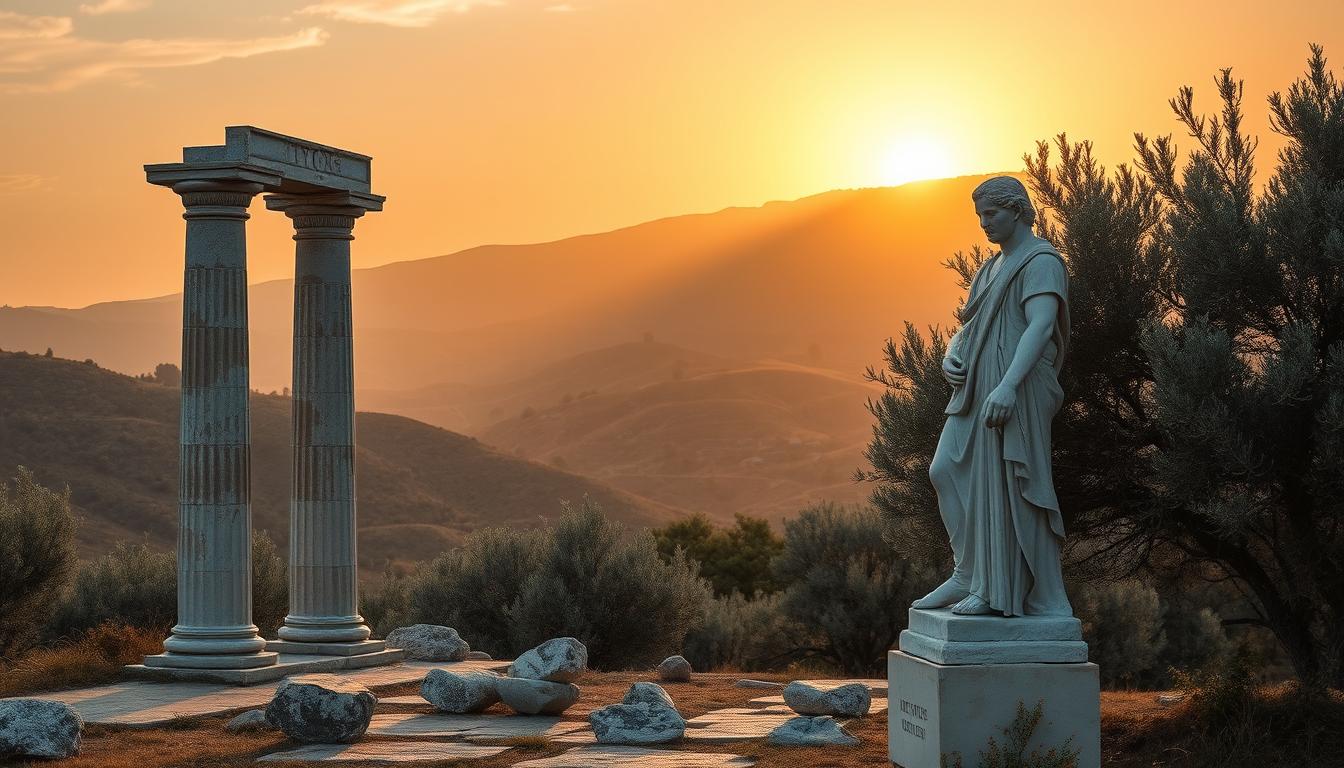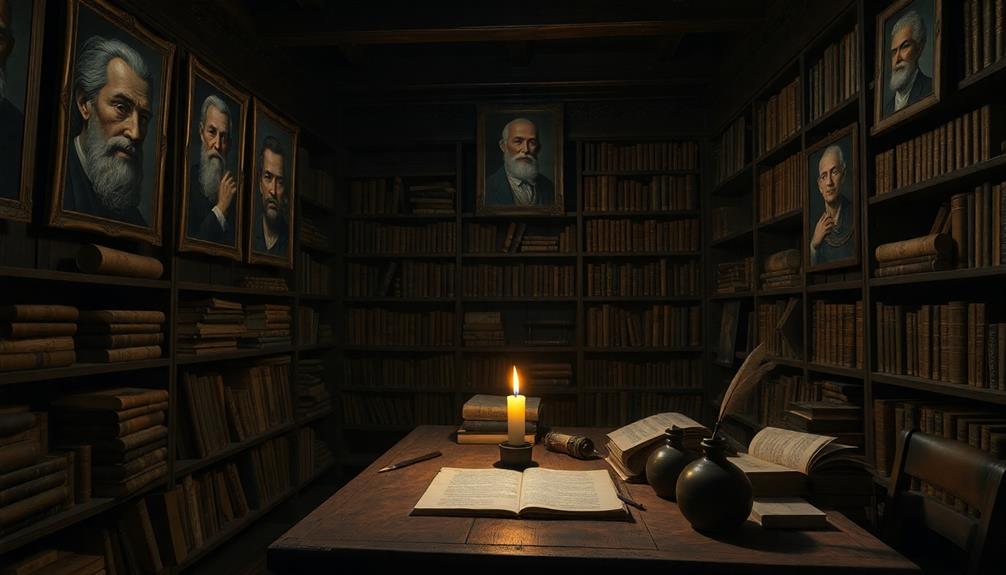You exist as a character in a complex myth that shapes your identity, values, and understanding of the world. Myths serve as narratives reflecting societal truths, maneuvering ethical dilemmas and cosmic questions. You're part of something bigger, experiencing growth and transformation like archetypal figures in these stories. These modern myths still resonate today, addressing contemporary issues and personal struggles. The philosophical debate around myths offers insights into your life's purpose and connections with others. By exploring this topic further, you'll uncover how these narratives influence your journey and the collective human experience.
Key Takeaways
- Life can be viewed as a narrative within a larger mythic context, encouraging exploration of identity and purpose.
- Myths serve as ethical guides, providing insights into moral dilemmas and illustrating the consequences of actions.
- Characters in myths embody universal traits, reflecting human experiences and societal challenges that resonate with contemporary life.
- Recognizing shared myths fosters empathy and solidarity, highlighting our interconnectedness through collective human experiences.
- Modern myths address current issues, adapting ancient narratives to inspire hope and critique societal values and norms.
The Nature of Myths
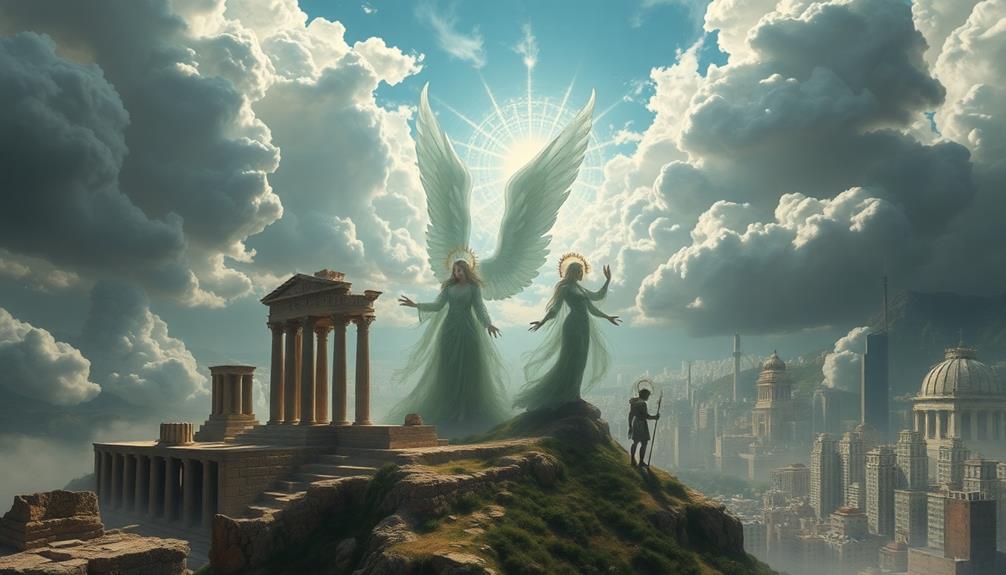
While you might think of myths as just ancient stories, they actually serve a deeper purpose in society. Myths express societal values and norms, evolving over time to reflect contemporary human experiences and dilemmas. Finnish folklorist Lauri Honko defines myths as narratives that convey cultural truths, while anthropologist Bronislaw Malinowski sees them as historical realities rather than mere fiction. This perspective highlights the significance of myths in shaping our understanding of the world.
The complexity of myths lies in their multifaceted nature; they're not singular tales but evolving webs of narratives that adapt to societal changes. They serve as frameworks for grappling with cosmic questions and existential issues, articulating ethical dilemmas and human anxieties. In this way, myths help you make sense of your place in the universe.
Even in modern contexts, myths play an essential role. They exist across cultural frameworks, influencing political ideologies and social movements, while addressing current challenges and concerns.
Myths and Modern Society
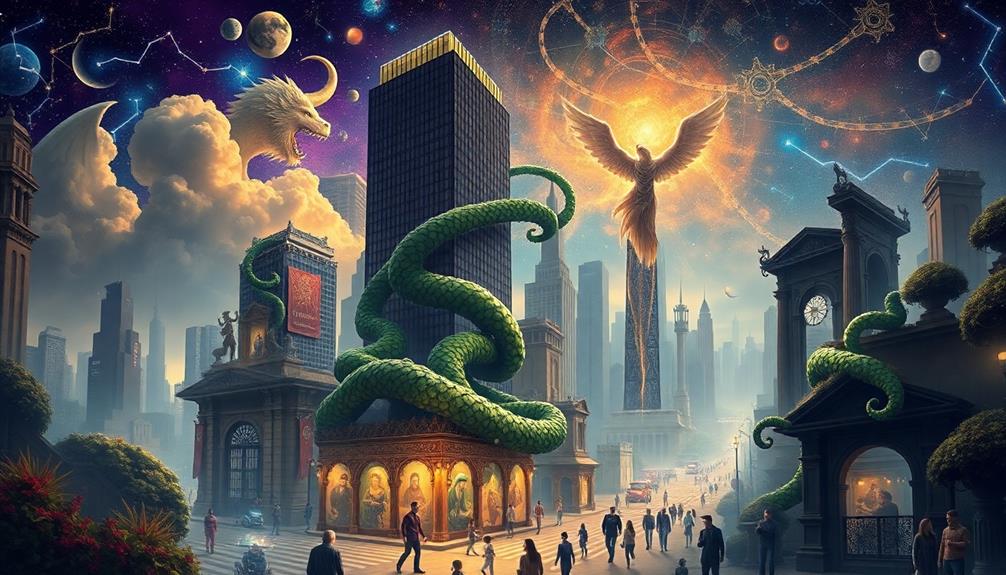
You might notice how myths in popular culture reflect your own identity and the issues you face today.
These modern narratives tackle everything from social justice to environmental concerns, showing that myth-making isn't just a thing of the past.
As you explore these stories, consider how they shape your understanding of the world and your place in it.
Myths in Popular Culture
Modern society's fascination with myth is evident in its popular culture, where ancient narratives are reimagined to tackle contemporary issues. You see this in films, literature, and video games that reinterpret classic tales, allowing you to engage with universal themes like identity and morality. Today's mythical figures often embody archetypal qualities found in traditional myths, resonating with you on a deeper psychological level, as Joseph Campbell's "hero's journey" illustrates.
| Mythic Elements | Modern Interpretations |
|---|---|
| Hero's Journey | Superhero narratives |
| Creation Myths | Fantasy worlds |
| Moral Lessons | Ethical dilemmas in storytelling |
| Transformation | Character development |
The blending of genres in popular culture creates new mythic narratives that reflect current societal values and challenges. However, some resist acknowledging these modern myths, viewing them as mere entertainment. This dismissal overlooks their significant role in shaping contemporary beliefs and values. Ultimately, these narratives continue to evolve, ensuring that myth-making remains an essential part of your cultural experience.
Modern Myths and Identity
Exploring modern myths reveals how they shape our understanding of identity in a world that's constantly evolving. These myths provide frameworks that reflect our societal values and the challenges we face today. As you engage with popular culture—be it through films, literature, or art—you're likely to encounter modern myths that resonate with your own experiences and aspirations.
These narratives aren't mere relics of the past; they're crucial to our identity formation. Blending traditional and contemporary mythic elements, these stories help you navigate existential questions and ethical dilemmas, offering insights into both personal and collective identities. By acknowledging modern myths, you gain a deeper comprehension of how you and those around you construct meaning, identity, and purpose in your lives.
In this rapidly changing landscape, modern myths act as cultural resources, guiding you through the complexities of existence. Whether it's a hero's journey or a cautionary tale, these narratives help you forge connections with others and understand your place in society.
Ultimately, modern myths are fundamental in shaping who you're and how you relate to the world.
Myths Addressing Contemporary Issues
Many people find that myths addressing contemporary issues resonate deeply with their daily lives and struggles. These modern myths emerge from our society's challenges, reflecting our values and concerns about identity, morality, and existential questions. They speak to the complexities of your world, offering insights into shared human experiences.
Consider these powerful myths that echo your emotions:
- The Hero's Journey: This myth illustrates resilience and transformation, showing that everyone can rise against adversity.
- The Fall from Grace: This narrative emphasizes the moral dilemmas we face, urging you to reflect on your choices and their consequences.
- The Quest for Belonging: This myth captures the universal longing for connection, reminding you that you're not alone in your search for community.
As these myths evolve, they maintain relevance in discussions about justice and ethics. They serve as cultural resources, articulating the shared emotions and ethical dilemmas you encounter daily.
Philosophical Perspectives on Myth
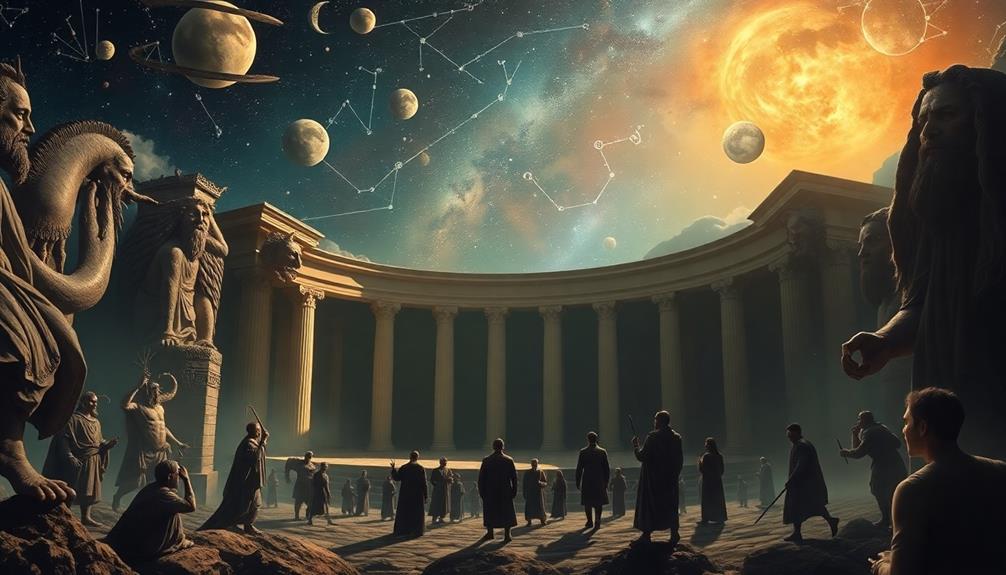
Throughout history, philosophers have turned to myths as powerful tools for unraveling complex ideas about existence and reality. Think of how Plato used myths to pose thought experiments, suggesting that these narratives can open up deeper insights into the nature of our world. Myths serve as an autonomous form of human expression, creating domains governed by spiritual principles, which help you understand reality beyond mere scientific explanations.
Early interpretations often viewed myths through allegorical lenses, with the Sophists arguing that they reveal moral truths while Epicureans dismissed them as fanciful tales.
As the Romantic movement emerged, the importance of poetic myth became clear, illustrating its central role in understanding human experience and the interplay between myth and religion.
Today, contemporary perspectives on myths explore their psychological and anthropological relevance. You can see how myths articulate collective hopes, fears, and existential dilemmas, reflecting cultural contexts that shape human understanding.
Characters and Narrative Structures
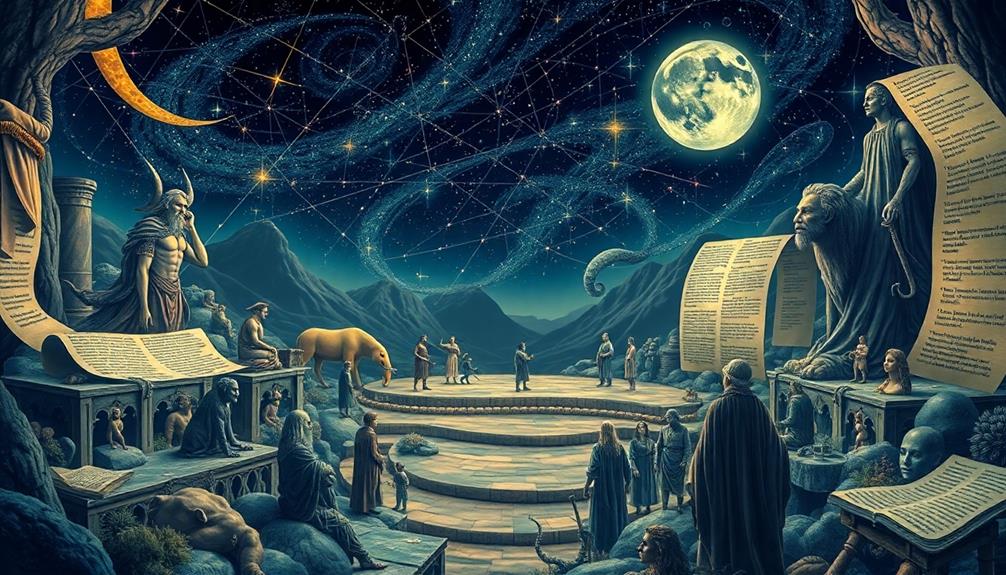
Delving into the world of myths, you'll find that characters often act as archetypes, embodying universal traits and experiences that resonate across different cultures and eras.
These characters help shape narrative structures that guide audiences through compelling journeys, reflecting the complexities of human existence. Just as symbols in spiritual alchemy represent transformation and enlightenment, the characters in myths often signify personal growth and the deeper meanings of our life's journey, emphasizing the importance of understanding symbols in shaping our spiritual paths.
- The Hero's Journey: You relate to the hero, facing trials that mirror your own struggles and desires.
- Conflicts and Resolutions: The clashes between characters symbolize larger societal issues, making you question your own role within the collective narrative.
- Transformation and Growth: Watching characters evolve can inspire you to embrace change and confront your own dilemmas.
These narrative structures typically follow a clear progression: a beginning that sets the stage, a middle filled with challenges, and an end that reveals insights or resolutions.
The interplay between characters and these structures allows for an exploration of complex themes like morality and identity. As characters adapt to reflect cultural values, you see how storytelling evolves, inviting you to ponder your own place in the larger mythos of life.
Ultimately, you realize that both characters and narrative structures play an essential role in shaping our understanding of existence.
The Role of Myths in Identity
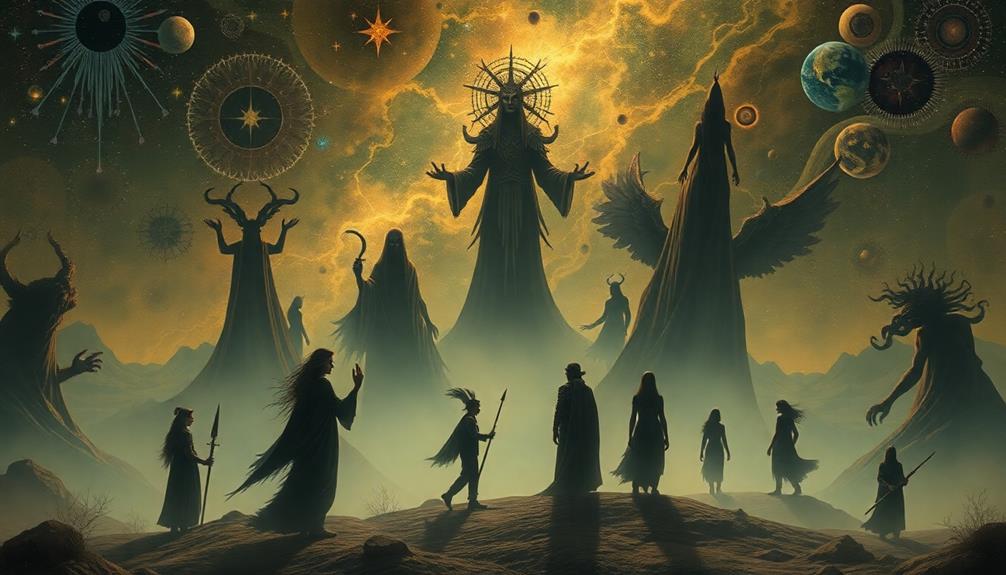
Myths play an essential role in shaping your identity, serving as foundational narratives that help you navigate the complexities of life. They provide frameworks for understanding cultural values and social norms, allowing you to connect with both individual and collective identities. The characterizations of heroes and deities in myths often reflect your own emotions, influencing how you perceive your role in society.
To illustrate the impact of myths on identity, consider the following table:
| Aspect of Identity | Role of Myths |
|---|---|
| Cultural Values | Offer shared beliefs and practices |
| Personal Interpretation | Allow for unique experiences to shape meaning |
| Ethical Questions | Help navigate moral dilemmas |
| Collective Narrative | Create a sense of belonging |
| Adaptation to Change | Reflect contemporary challenges |
Contemporary myths continue to evolve, adapting to modern challenges and reflecting current societal values. This dynamic interplay between personal and cultural myths enables you to construct your identity, guiding you through ethical questions and existential concerns while resonating with your unique experiences. Ultimately, myths help articulate who you are in relation to the world around you.
Myths as Cultural Commentary
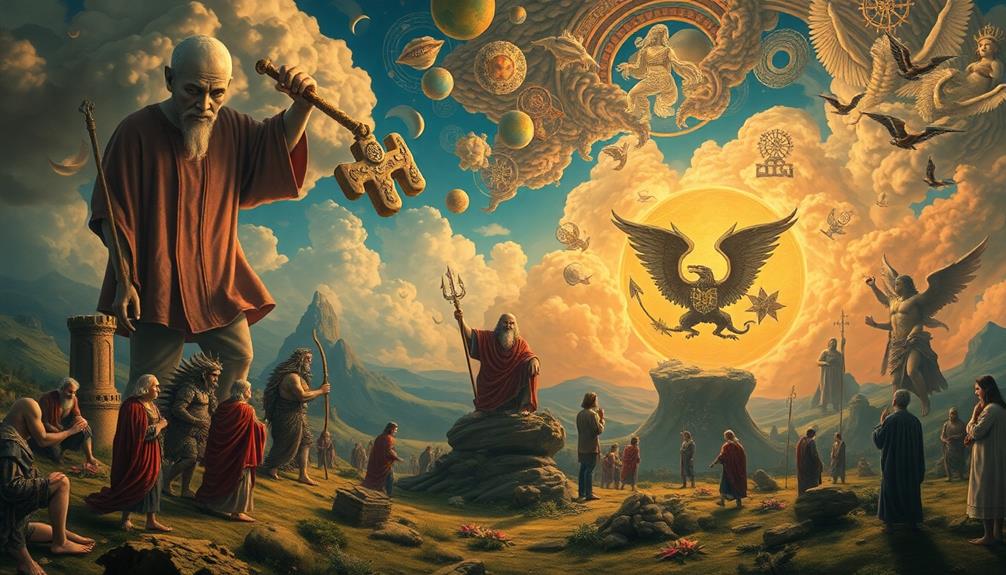
In examining the fabric of society, myths emerge as powerful cultural commentaries that encapsulate shared values and dilemmas. They reflect the collective consciousness of a community, providing insights into the ethical questions and existential crises that people face. By adapting ancient narratives to address contemporary challenges, myths serve as a bridge between the past and the present.
Consider how myths resonate with you:
- They reveal the underlying anxieties that plague your culture, helping you understand your fears.
- They inspire hopes and dreams, igniting a flame of aspiration within you.
- They challenge political ideologies, shaping your understanding of societal struggles and aspirations.
Myths as cultural commentary not only illuminate aspects of modern life, but they also critique it. The blending of genres in popular culture creates new mythic narratives that resonate with your experiences, ensuring that these stories remain relevant.
Resistance to Modern Myth-making
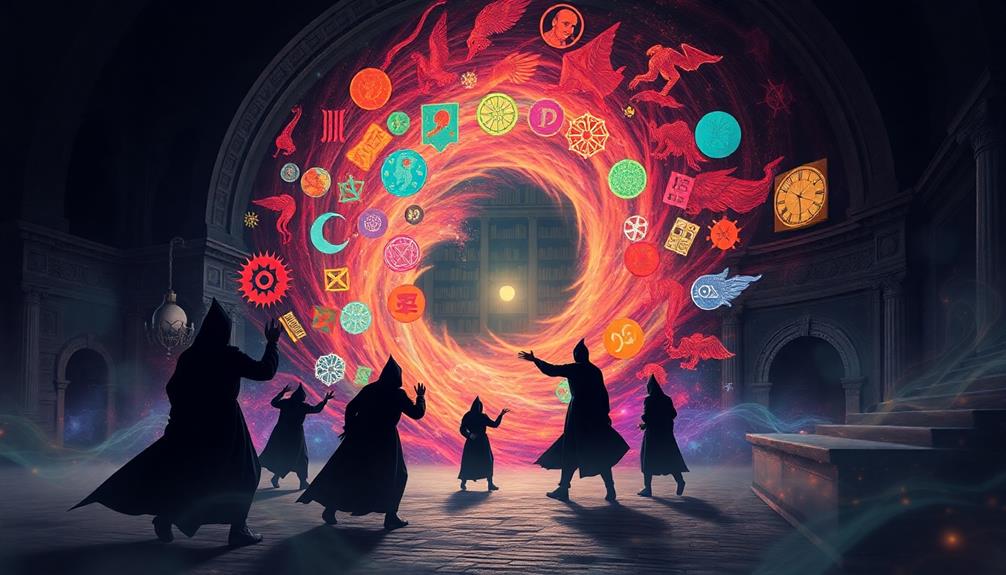
You might find it surprising how many people deny the existence of modern myths, dismissing them as mere fiction. This cultural prejudice overlooks the rich tapestry of myths woven into popular culture, which reflect our current values and struggles.
Much like the urban themes in contemporary Indian painting that mirror societal changes, modern myths serve as a reflection of our collective consciousness. By recognizing these narratives as valid, you can engage in a deeper conversation about identity and existence in today's world.
Denial of Modern Myths
Throughout history, many have resisted the idea of modern myth-making, believing that society has outgrown the need for such narratives. This denial often stems from a preference for Enlightenment ideals that prioritize rationality over the rich tapestry of human experience.
However, dismissing modern myths overlooks their significance in addressing the existential questions we all face today.
Consider these points:
- Connection: Modern myths shape our understanding of identity and community, helping you find your place in an ever-changing world. They can even parallel the importance of emotional regulation in fostering healthy interpersonal relationships.
- Understanding: They provide frameworks for grappling with ethical dilemmas, guiding you through moral landscapes that feel increasingly complex. Just as myths help navigate these complexities, the role of caregivers in shaping values and beliefs is essential to our development.
- Resilience: Embracing modern myths allows for deeper emotional resilience, offering stories that resonate with your struggles and triumphs.
Myths in Popular Culture
Modern myths have found fertile ground in popular culture, often surfacing through films, literature, and social media, yet they encounter significant resistance. Many dismiss these myths in popular culture as mere entertainment, failing to recognize their deeper significance. The Enlightenment period paved the way for skepticism towards traditional mythology, leading many to believe that modern society has outgrown the need for myth-making.
Additionally, misunderstandings about what constitutes a myth often limit its recognition to solely religious narratives. This narrow view overlooks how modern myths address existential questions and cultural anxieties. Scholars argue that these narratives are essential in helping you and others navigate contemporary challenges, yet they struggle for legitimacy in an academic world that prioritizes rational thought over mythic storytelling.
The blending of genres in popular culture creates a rich tapestry for new mythic narratives, ensuring that myth-making continues to evolve. As society faces new challenges, you can see how these modern myths resonate, offering insights and reflections that traditional narratives mightn't capture.
Embracing these myths in popular culture might just help you find meaning in an increasingly complex world.
Cultural Prejudice Against Myths
Cultural prejudice against modern myths often stems from a deep-seated belief that traditional storytelling has lost its significance in an age dominated by rational thought.
This misconception overlooks the evolving nature of myths and their ability to resonate with contemporary experiences. You might find yourself caught in a cycle of skepticism, dismissing modern narratives as mere entertainment rather than recognizing their mythic qualities.
Consider these points:
- Significance: Myths can provide meaning and understanding in today's complex world, just as they did in the past.
- Connection: They foster a sense of community and shared identity, bridging gaps between generations and cultures.
- Adaptability: Modern myths evolve with society, reflecting current values and struggles, making them essential for cultural dialogue.
The Intersection of Myth and Reality
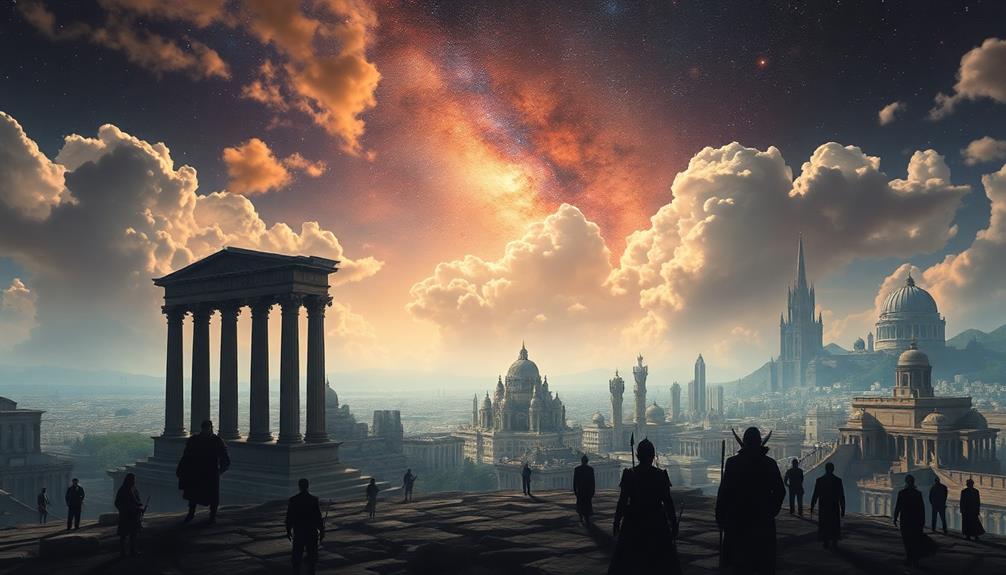
Many people find themselves traversing a world where myth and reality intertwine, shaping their identities and experiences. Myths serve as frameworks that help you understand the complexities of existence, often blending the narratives you encounter with your lived reality. Philosophers argue that, like characters within myths, you embody roles defined by cultural narratives, influencing your personal identity and moral choices.
Paul Ricoeur's insights on narrative discourse suggest your life can be viewed as a story unfolding within a larger mythic context. This perspective invites you to reflect on how the myths you engage with shape your understanding of the world.
The complexity of these myths mirrors societal values and challenges, indicating that the narratives you live by can evolve as cultural contexts shift, much like characters adapting to their mythological environments.
As you navigate your life, consider how your understanding of existence is filtered through symbolic interpretations, similar to characters in mythological tales. Recognizing this intersection of myth and reality allows you to gain a deeper appreciation for the stories that shape your experiences and the roles you play in the grand narrative of life.
Implications for Human Existence
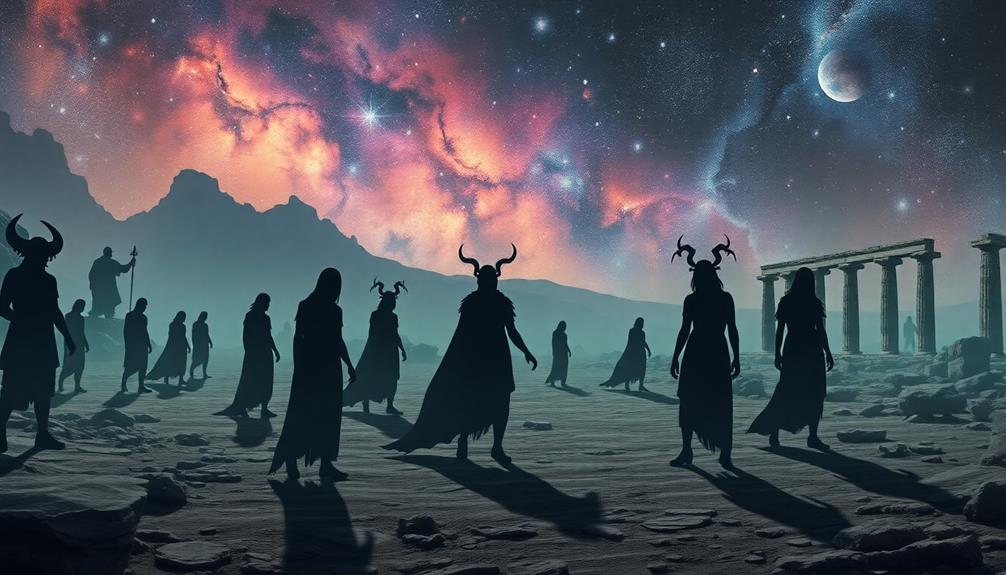
The concept of viewing yourself as a character in a myth carries profound implications for your existence. It shifts how you perceive your life, suggesting that your experiences may be intertwined with larger narratives that define cultural values and existential questions. This perspective echoes the ideas of philosophers like Plato, who used myths as thought experiments to explore human nature.
Consider these implications:
- Self-Discovery: Recognizing yourself as part of a myth encourages you to explore your identity and purpose within a broader story.
- Moral Framework: Myths offer insights into ethical dilemmas, helping you navigate complex moral landscapes that arise in your daily life.
- Connection to Others: Understanding that your struggles and triumphs reflect shared human experiences fosters a sense of belonging and empathy towards others.
Frequently Asked Questions
Who Are the Characters in Myths Usually?
In myths, you'll find characters embodying archetypal traits like heroes, tricksters, and wise guides. They face trials, showcasing human flaws and virtues, ultimately reflecting cultural truths and moral lessons relevant to your own life experiences.
Are All Myths Entirely Fictional?
Myths aren't just fanciful tales; they're mirrors reflecting human experiences. While some elements might be fictional, they embody cultural truths, adapting to societal changes. So, no, not all myths are entirely fictional.
What Is Myth in Philosophy?
Myth in philosophy serves as a narrative tool, illuminating fundamental truths about existence and morality. It blends emotional experience with rational thought, allowing you to explore complex ideas and gain deeper insights into human life.
What Are the Criteria for a Myth?
Did you know 70% of cultures have their own creation myths? Myths typically express societal values, address existential questions, evolve with society, convey deep meanings, and feature complex narratives, making them rich cultural resources beyond simple stories.
Conclusion
In exploring the idea that we might be characters in a myth, you uncover a tapestry woven from narratives that shape our identities and societies. Picture your life as a vibrant mosaic, each piece representing a myth that informs your beliefs and actions. As you navigate this intricate design, consider how these stories influence your reality. Embracing this perspective allows you to challenge conventions, question your role, and ultimately reshape your own narrative in this ever-evolving mythic landscape.





